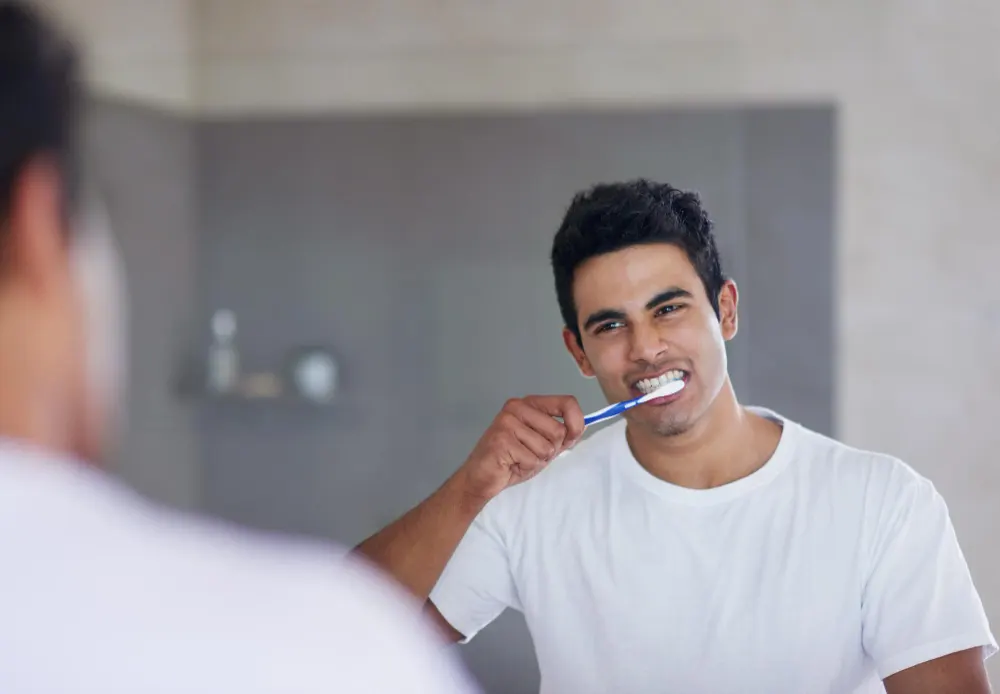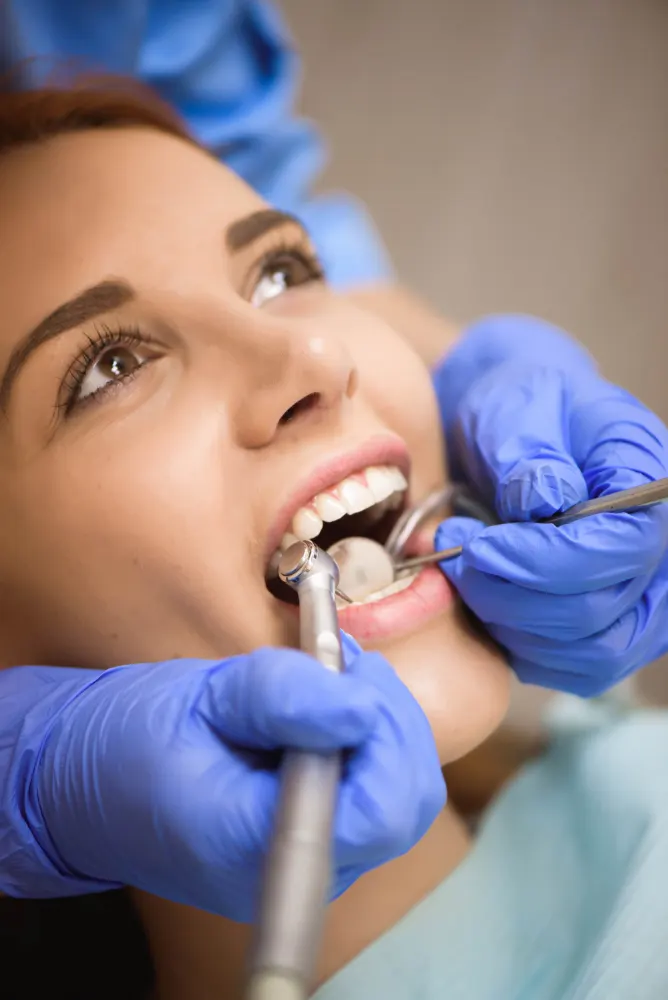
Immediately following your surgery
- Bite on the gauze pad placed over the surgical site for an hour. After this time, the gauze pad should be removed and discarded and replaced by another gauze pad. Refer to the section on BLEEDING for specific details.
- Avoid vigorous mouth rinsing or touching the wound area following surgery. If you rinse your mouth vigorously or touch the area, you may cause bleeding due to the blood clot that has recently formed being dislodged!
- To minimize any swelling, place ice packs on the areas of your face where surgery was performed. Refer to the section on SWELLING for further explanation.
- Take your prescribed pain medication as soon as you can so it is digested before the local anesthetic has worn off. Eat something you don’t have to chew very much to coat your stomach. Foods such as pudding, a milkshake, or better yet, a protein shake will help minimize nausea from your pain medication. Refer to the section on PAIN for specific details.
- Restrict your activities on the day of surgery and resume normal activity when you feel comfortable. If you are active, your heart will be beating harder and you can expect excessive bleeding and throbbing from the wound.
- NO SMOKING UNDER ANY CIRCUMSTANCES!
- A certain amount of bleeding is to be expected following your surgery. On the surface of your skin, where the surface is dry, bleeding clots in 10 minutes. Inside your mouth, where it is wet, it takes 6-8 hours for the clot to gel or set up and thus it takes longer for any bleeding to subside. Slight bleeding or oozing which causes redness in your saliva is very common. For this reason, a gauze pad will always appear red when it is removed. When your mouth “waters”, saliva washes over the blood clots and dyes the gauze red even after bleeding from the sockets have stopped.
- Excessive bleeding may be controlled by first GENTLY rinsing or wiping any old clots from your mouth, then placing a gauze pad over the area and biting firmly for sixty minutes. Repeat as necessary.
- If bleeding continues, bite on a moistened tea bag for thirty minutes. This might sound unusual, but the tannic acid in the tea bag helps to form a clot by contracting your blood vessels. This can be repeated several times.
- To minimize further bleeding, sit upright, do not become excited, maintain constant pressure on the gauze (no talking or chewing) and avoid exercise.
- If bleeding does not subside after 6-8 hours, call the office for further instructions at 361-857-6200.
- The amount of swelling you can normally expect is usually proportional to the surgery involved. There is usually a fair amount of cheek retraction involved with the removal of your impacted wisdom teeth. Therefore, you should expect swelling of your cheek after your surgery.
- The swelling will not become apparent until the day following your surgery and will not reach its maximum until 2-3 days post-operatively.
- Swelling may be minimized by the immediate use of ice packs. Sealed plastic bags filled with ice, ice packs, or a bag of frozen peas or corn wrapped in a washcloth should be applied to the side of the face where surgery was performed.
- You should apply ice packs repeatedly, 20 minutes on/20 minutes off for the afternoon and evening immediately following your extraction(s). After 24 hours, ice has no beneficial effect.
- After thirty-six (36) hours have passed following your surgery, the application of moist heat to the side of the face may help some in reducing the size of any swelling that has formed.
- If swelling or jaw stiffness has persisted for several days, there is no cause for alarm. Soft, puffy swelling that you can indent with your finger after oral surgery is very normal.
- However, Bright red, rock-hard, hot swelling that does not indent with finger pressure and which is getting bigger by the hour would suggest infection. This situation would usually develop around days 3-4 after surgery when you would expect swelling to be subsiding, not increasing! If this should occur, please call our office at 361-857-6200.

Temperature
- It is normal to run a low-grade temperature (99-100F) for 7-10 days following oral surgery. This reflects your body’s immune response to normal bacteria that are present in your mouth. A high temperature (>101F) might occur for 6-8 hours after surgery, but not longer than that.
- 2 Tylenol or 2-4 Ibuprofen every 4-6 hours will help to moderate a temperature.
- A temperature greater than 101F which occurs several days after your surgery, especially if accompanied by that rock-hard swelling and increased pain mentioned earlier, is usually indicative of infection. You should call the office for instructions if this should occur at 361-857-6200.
Bruising
- When your wisdom teeth are removed, there is a good chance that there will be some bruising on the surface skin over the area. The most common location is over the upper eye teeth (on the cheek and below the eye).
- Bruising may not be obvious for a day or two. By the time it reaches the surface, it may have already turned from purple to green to yellow.
- Over several days the yellow color will settle down the neck to about chest height before it disappears.
- Pain or discomfort following surgery is expected to last 4-5 days. For many patients, it seems the third and fourth days may require more pain medicine than the first and second days. Following the fourth day pain should subside more and more every day.
- Many medications for pain can cause nausea or vomiting. It is wise to have something of substance in your stomach (yogurt, ice cream, pudding, or apple sauce) before taking prescription pain medicines and/or over-the-counter pain medicines (especially aspirin or ibuprofen). Even coating the stomach with Pepto Bismol or Milk of Magnesia can help prevent or minimize nausea.
- For moderate pain, one or two tablets of Tylenol or Extra Strength Tylenol may be taken every three to four hours or Ibuprofen (Motrin or Advil) two-four 200 mg tablets may be taken every 3-4 hours.
- For severe pain take the tablets prescribed for you by Doctor Van Maren as directed every 4 hours in addition to the Tylenol or Ibuprofen. Your prescribed pain medicine will make you groggy and will slow down your reflexes. Do not drive an automobile work around or operate heavy machinery if you are taking prescription pain medicine. Alcohol and prescription pain medicines do not mix!
- If prescription pain medications are required beyond 4 days, further treatment may be indicated. Please call the office and discuss your situation with us at 361-857-6200.
Antibiotics
- Antibiotics are NOT given as a routine procedure after oral surgery. The overuse of antibiotics can lead to the development of resistant bacteria. This is well documented; so careful consideration is given to each circumstance when deciding whether antibiotics are necessary. In specific circumstances, antibiotics will be given to help prevent infection or treat an existing infection.
- If you have been placed on antibiotics, take the tablets or liquid medication as directed. You should take them on schedule until they are completely gone.
- Discontinue antibiotic use in the event of a rash or other unfavorable reaction. You should call the office at 361-857-6200 to report any such finding or if you have any questions.
Diet
- Drink plenty of fluids. Try to drink 5-6 eight-ounce glasses the first day.
- Drink from a glass or cup and don’t use a straw. The sucking motion will suck out the healing blood clot and start the bleeding again.
- Avoid hot liquids or food while you are numb so you don’t burn yourself!
- Soft food and liquids can be eaten on the day of surgery. The act of chewing doesn’t damage anything, but you should avoid chewing sharp or hard objects at the surgical site for several days.
- Return to a normal diet as soon as possible unless otherwise directed. You will find eating multiple small meals is easier than three regular meals for the first few days.
- You will feel better, have more strength, less discomfort, and heal faster if you continue to eat.
- If you suddenly sit up or stand from a lying position, you may become dizzy. Therefore, immediately following surgery, if you are lying down, make sure you sit for one minute before standing.

- Good oral hygiene is essential to the proper healing of any oral surgery site.
- You can brush your teeth the night of surgery but rinse very gently. Vigorous rinsing should be avoided until the day following your surgery.
- The day after surgery you should begin rinsing at least 5-6 times a day, especially after eating. Salt water (a cup of warm water mixed with a teaspoon of salt) is ideal but plain water is also OK.
- Mouthwash has an alcohol base to it, so it may be pretty “zingy” when it comes in contact with fresh oral wounds. After a few days, dilute your mouthwash in half with tap water and rinse out your mouth. This will make it taste and smell better. You can gradually build up to full-strength mouthwash as you feel more comfortable.
Smoking
- No smoking for 48 hours after surgery! Smoking retards healing dramatically. Nicotine constricts blood vessels which slows the formation and expansion of the healing blood clot in the socket. This leads to the painful complication called a “Dry Socket”.
- After 48 hours, if you feel you need so much as one Tylenol or aspirin to control pain, you should avoid any smoking of any kind! This usually means that the clot has not grown enough to cover all the exposed bone in the socket. The exposed bone is filled with raw nerve endings! Until the nerve endings are covered with a healthy blood clot, they will continue to cause you pain. Smoking will slow this process significantly and make your pain even worse.
- Therefore, if there is any question about smoking…..DON’T DO IT.
Activity
- You should keep physical activities to a minimum for 6-12 hours following surgery.
- If you are considering exercise, throbbing or bleeding may occur. If this occurs, you should discontinue exercising.
- Keep in mind that you are probably not taking normal nourishment. This may weaken you and further limit your ability to exercise.
Nausea and Vomiting
- In the event of nausea and/or vomiting following surgery, do not take anything by mouth for at least an hour including the prescribed medicine.
- You should then sip on coke, tea, or ginger ale. Avoid milk products! You should sip slowly over a fifteen-minute period.
- Before you resume taking any medicine always try to coat the stomach with something of substance.
- Coating the stomach with Pepto Bismol or Milk of Magnesia may help get the nausea to subside.
- If nausea and/or vomiting persist after 12 hours, please call the office at 361-857-6200, so Doctor Van Maren can order some Compazine suppositories to help resolve the problem.


Other Complications
- If numbness of the lip, chin, or tongue occurs there is no cause for alarm. As stated before surgery, this is usually temporary. You should be aware that if your lip or tongue is numb you could bite it and not feel it so be careful. Call Dr. Van Maren at 361-857-6200 if you have any questions about this.
- Occasionally, patients may feel hard projections in the mouth with their tongue. They are not roots; they are the bony walls that support the tooth (the walls of the tooth socket). These projections usually smooth out on their own. You may not notice this for days to weeks after surgery. If the rough edges bother your tongue or cheeks, call the office so Dr. Van Maren can evaluate the area and smooth them down for you if necessary.
- If the corners of your mouth are stretched, they may dry out and crack. Your lips should be kept moist with an ointment such as Vaseline.
- Sore throats and pain when swallowing are not uncommon. The muscles get swollen and the normal act of swallowing can then become painful. This will subside in 2-3 days.
- Stiffness (Trimus) of the jaw muscles may cause difficulty in opening your mouth for 7-10 days following surgery. This is a normal post-operative event that will resolve in time. The muscles that operate the jaw are not used to being held open for prolonged periods of time. Don’t be alarmed. The physical therapy of eating, talking, yawning, and chewing will help any stiffness to resolve.
Commonly Asked Questions Following Oral Surgery
- A dry socket is a healing problem. When the blood clot gets dislodged prematurely from the tooth socket or does not expand to fill the socket the bone is left exposed. Exposed bone means raw nerve endings. They will cause pain until they are covered over by a healing blood clot.
- A dry socket is different from an infection. Therefore, antibiotics alone may not help a dry socket.
- Symptoms of pain at the surgical site and even pain referred to the ear may occur 3-4 days following surgery without increased swelling or increased temperature are classic.
- There is a much higher incidence of dry sockets in smokers because smoking retards the healing of all wounds. No smoking for 48 hours following surgery. If you have any pain requiring even one Tylenol or Aspirin to treat, expect that it will get much worse if you smoke due to diminished healing.
- If these symptoms occur you should call the office at 361-857-6200 for evaluation and treatment by Doctor Van Maren.
- Bright red, rock-hard swelling on the surface over a surgical site that is increasing rather than declining at 3-4 days after surgery
- Elevated temperature >101F
- Increased pain after 3-4 days that is not controlled by Ibuprofen
- Pus draining from the surgery site accompanied by a sour or salty taste in the mouth
- Sutures are placed in the area of surgery to minimize post-operative bleeding and to help healing. Sometimes they become dislodged; this is no cause for alarm. Just remove the suture from your mouth with tweezers and discard it.
- The remaining sutures will be removed approximately one week after surgery.
- The removal of sutures requires no anesthesia or needles. It takes only a minute or so, and there is no discomfort associated with this procedure. So it’s really nothing to worry about.
- Occasionally, patients may feel hard projections in the mouth with their tongue in the area of surgery. They are not roots or parts of the tooth. They are the bony walls that support the tooth in the jawbone (the walls of the tooth socket). We call this a spicuole.
- Given enough time, these projections will smooth out spontaneously. You may not notice this for days to weeks after surgery.
- If the rough edges bother your tongue or cheeks, call the office so Dr. Van Maren can evaluate the area and smooth them down for you if necessary.
- If numbness of the lip, chin, or tongue occurs there is no cause for alarm. As stated before surgery, this is usually temporary in nature.
- Just like stretching on the cheek causes swelling, stretching on the nerves within or next to the jaw causes swelling. A swollen nerve stops working for a while so the area it innervates feels numb.
- The vast majority of patients with such numbness find it to resolve spontaneously slowly after surgery. It could take weeks to months to resolve but in rare cases, it could linger indefinitely.
- Since your lip or tongue is numb, be careful not to bite or burn it after surgery.
- Call Dr. Van Maren at 361-857-6200 if you have any questions about this.

